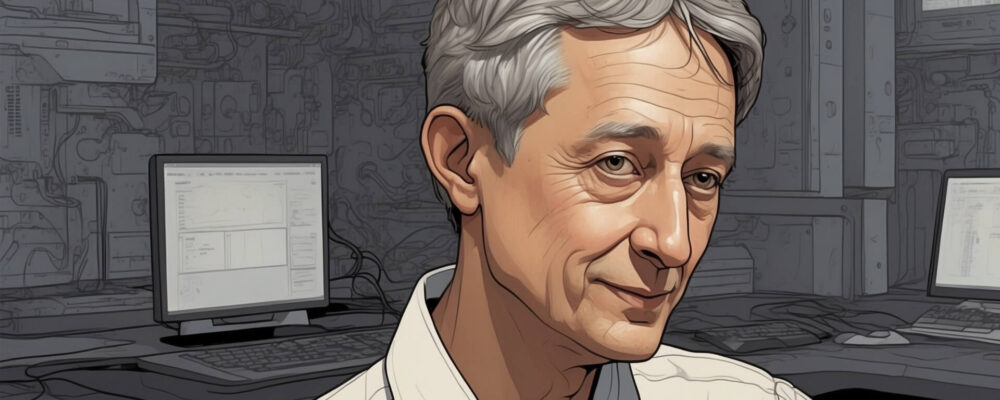Geoffrey Hinton: The Godfather of Deep Learning and Pioneer of Artificial Intelligence
Introduction
In the realm of artificial intelligence (AI), few names carry as much weight as Geoffrey Hinton. Often referred to as the “Godfather of Deep Learning,” Hinton’s groundbreaking work has laid the foundation for modern AI, influencing everything from image recognition to natural language processing. His contributions have not only advanced the field but have also inspired a new generation of AI researchers and innovators.
But who is Geoffrey Hinton, and how has he shaped the landscape of AI? This profile delves into his remarkable journey, his key contributions, and the lasting impact he continues to make on technology and society.
A Passion for Intelligence: The Early Years
Geoffrey Hinton’s fascination with the mind and intelligence began early in his academic career. Born in Wimbledon, London, Hinton pursued a Bachelor’s degree in Experimental Psychology at the University of Cambridge. He then went on to earn a Ph.D. in Artificial Intelligence from the University of Edinburgh, where he started to explore the possibilities of neural networks—computational systems inspired by the human brain.
Hinton’s early work was met with skepticism by some in the academic community, but he remained committed to his vision. His research on neural networks and backpropagation, a method for training these networks, became the cornerstone of deep learning—a field that would revolutionize AI in the decades to come.
Pioneering Deep Learning: The Breakthroughs
One of Hinton’s most significant contributions to AI is the development of backpropagation algorithms, which allow neural networks to learn from data. This breakthrough made it possible for machines to improve their performance on tasks like image recognition, speech recognition, and language translation—areas where AI now excels.
Hinton’s work didn’t stop there. He co-developed the concept of deep belief networks, a type of neural network that uses layers of abstraction to model complex data patterns. This innovation paved the way for deep learning models that could outperform traditional machine learning methods on a variety of tasks.
Leading the AI Revolution: Roles and Influence
Throughout his career, Geoffrey Hinton has held key academic and industry positions that have allowed him to push the boundaries of AI. He served as a professor at Carnegie Mellon University and the University of Toronto, where he mentored many of today’s leading AI researchers.
In 2012, Hinton co-founded DNNresearch, a startup focused on deep learning, which was later acquired by Google. At Google, he became a Distinguished Researcher and helped lead the Google Brain team, working on projects that have shaped the future of AI. His work on neural networks and deep learning has influenced the development of AI technologies that are now integral to industries such as healthcare, finance, and autonomous driving.
Impacting the World: Influence and Legacy
Geoffrey Hinton’s influence on AI is immeasurable. His research has led to the creation of AI systems that can diagnose diseases, translate languages, and even generate art. His contributions to AI have earned him numerous accolades, including the prestigious Turing Award in 2018, which he shared with fellow AI pioneers Yann LeCun and Yoshua Bengio.
Hinton’s legacy extends beyond his technical achievements. As a mentor and thought leader, he has inspired a generation of AI researchers who continue to build on his work. His commitment to understanding the brain and creating machines that can learn like humans has set the stage for the future of AI.
A Visionary’s Perspective: Ethics and the Future of AI
Geoffrey Hinton is not only a brilliant scientist but also a thoughtful leader in the ethical implications of AI. He has been an advocate for the responsible development of AI technologies, emphasizing the need for transparency, fairness, and accountability. Hinton believes that while AI has the potential to do immense good, it must be developed with caution to avoid unintended consequences.
His work continues to influence discussions on AI ethics, particularly in areas like bias in AI models and the societal impact of automation. Hinton’s vision for AI is one where machines enhance human capabilities and contribute to solving some of the world’s most pressing challenges.
The Future of AI: Geoffrey Hinton’s Ongoing Work
As AI continues to evolve, Geoffrey Hinton remains at the forefront of research and innovation. His current work focuses on capsule networks, a new type of neural network architecture that aims to overcome some of the limitations of traditional deep learning models. This research could lead to AI systems that are even more capable of understanding and interacting with the world.
Hinton’s influence will undoubtedly continue to shape the future of AI, as his work inspires new breakthroughs and helps guide the ethical development of this powerful technology.
Join the AI Revolution
Geoffrey Hinton’s story is a testament to the power of perseverance and vision in the face of skepticism. His work has not only advanced the field of AI but has also laid the groundwork for a future where intelligent machines can improve lives and solve complex problems.
If you’re inspired by Geoffrey Hinton’s journey and want to stay at the cutting edge of AI developments, join us at AI Core Innovations. Here, we explore the latest in AI technology, share insights from industry leaders, and provide the resources you need to stay ahead in this rapidly evolving field. Sign up for our newsletter and be part of the AI revolution.

